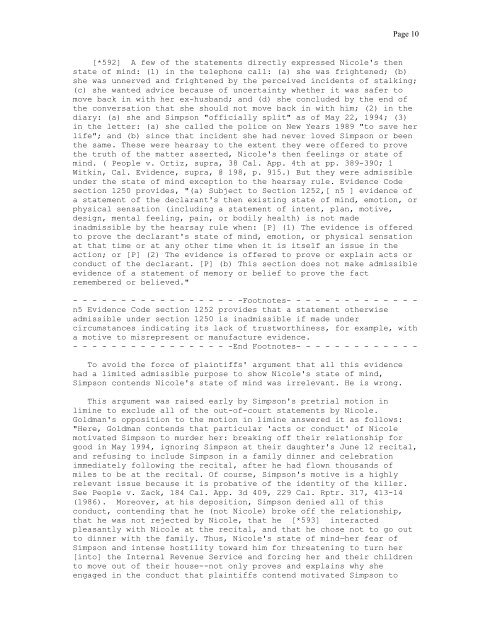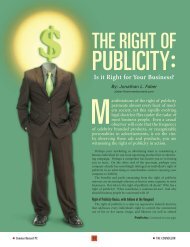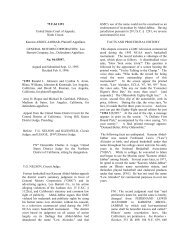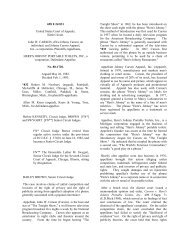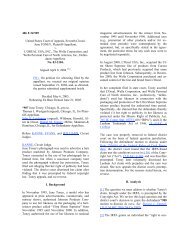Rufo v. OJ Simpson - Right Of Publicity
Rufo v. OJ Simpson - Right Of Publicity
Rufo v. OJ Simpson - Right Of Publicity
Create successful ePaper yourself
Turn your PDF publications into a flip-book with our unique Google optimized e-Paper software.
Page 10<br />
[*592] A few of the statements directly expressed Nicole's then<br />
state of mind: (1) in the telephone call: (a) she was frightened; (b)<br />
she was unnerved and frightened by the perceived incidents of stalking;<br />
(c) she wanted advice because of uncertainty whether it was safer to<br />
move back in with her ex-husband; and (d) she concluded by the end of<br />
the conversation that she should not move back in with him; (2) in the<br />
diary: (a) she and <strong>Simpson</strong> "officially split" as of May 22, 1994; (3)<br />
in the letter: (a) she called the police on New Years 1989 "to save her<br />
life"; and (b) since that incident she had never loved <strong>Simpson</strong> or been<br />
the same. These were hearsay to the extent they were offered to prove<br />
the truth of the matter asserted, Nicole's then feelings or state of<br />
mind. ( People v. Ortiz, supra, 38 Cal. App. 4th at pp. 389-390; 1<br />
Witkin, Cal. Evidence, supra, @ 198, p. 915.) But they were admissible<br />
under the state of mind exception to the hearsay rule. Evidence Code<br />
section 1250 provides, "(a) Subject to Section 1252,[ n5 ] evidence of<br />
a statement of the declarant's then existing state of mind, emotion, or<br />
physical sensation (including a statement of intent, plan, motive,<br />
design, mental feeling, pain, or bodily health) is not made<br />
inadmissible by the hearsay rule when: [P] (1) The evidence is offered<br />
to prove the declarant's state of mind, emotion, or physical sensation<br />
at that time or at any other time when it is itself an issue in the<br />
action; or [P] (2) The evidence is offered to prove or explain acts or<br />
conduct of the declarant. [P] (b) This section does not make admissible<br />
evidence of a statement of memory or belief to prove the fact<br />
remembered or believed."<br />
- - - - - - - - - - - - - - - - - -Footnotes- - - - - - - - - - - - - -<br />
n5 Evidence Code section 1252 provides that a statement otherwise<br />
admissible under section 1250 is inadmissible if made under<br />
circumstances indicating its lack of trustworthiness, for example, with<br />
a motive to misrepresent or manufacture evidence.<br />
- - - - - - - - - - - - - - - - -End Footnotes- - - - - - - - - - - - -<br />
To avoid the force of plaintiffs' argument that all this evidence<br />
had a limited admissible purpose to show Nicole's state of mind,<br />
<strong>Simpson</strong> contends Nicole's state of mind was irrelevant. He is wrong.<br />
This argument was raised early by <strong>Simpson</strong>'s pretrial motion in<br />
limine to exclude all of the out-of-court statements by Nicole.<br />
Goldman's opposition to the motion in limine answered it as follows:<br />
"Here, Goldman contends that particular 'acts or conduct' of Nicole<br />
motivated <strong>Simpson</strong> to murder her: breaking off their relationship for<br />
good in May 1994, ignoring <strong>Simpson</strong> at their daughter's June 12 recital,<br />
and refusing to include <strong>Simpson</strong> in a family dinner and celebration<br />
immediately following the recital, after he had flown thousands of<br />
miles to be at the recital. <strong>Of</strong> course, <strong>Simpson</strong>'s motive is a highly<br />
relevant issue because it is probative of the identity of the killer.<br />
See People v. Zack, 184 Cal. App. 3d 409, 229 Cal. Rptr. 317, 413-14<br />
(1986). Moreover, at his deposition, <strong>Simpson</strong> denied all of this<br />
conduct, contending that he (not Nicole) broke off the relationship,<br />
that he was not rejected by Nicole, that he [*593] interacted<br />
pleasantly with Nicole at the recital, and that he chose not to go out<br />
to dinner with the family. Thus, Nicole's state of mind—her fear of<br />
<strong>Simpson</strong> and intense hostility toward him for threatening to turn her<br />
[into] the Internal Revenue Service and forcing her and their children<br />
to move out of their house--not only proves and explains why she<br />
engaged in the conduct that plaintiffs contend motivated <strong>Simpson</strong> to


